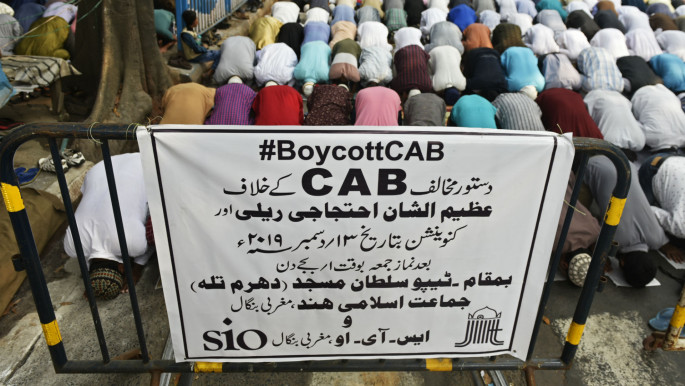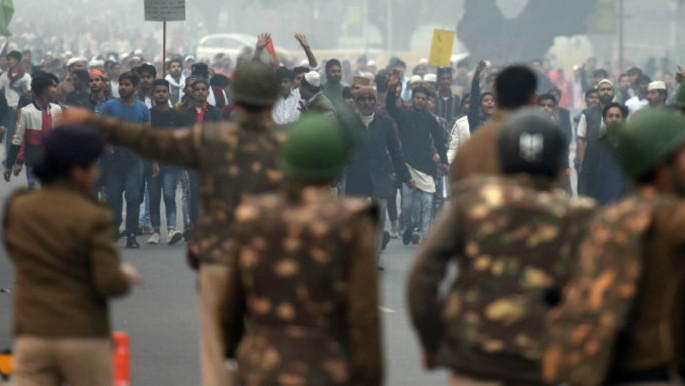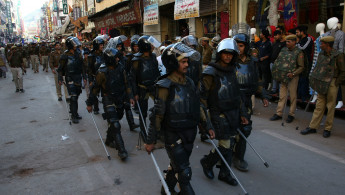'A threat to the plural structure of India': Anger brews over controversial citizenship law
At least 25 people have died so far as demonstrations turned violent in many states where protesters have been defying curbs and pelting stones at security forces.
According to media reports, protesters in many states set government buses ablaze and vandalised properties.
Alone in the most populous northern state of Utter Pradesh (UP) ruled by the Prime Minister Narendra Modi's Bharatiya Janata Party (BJP) fifteen people were killed including an eight-year-old boy during the clashes.
Eyewitnesses said hundreds of thousands of people took part in different protest rallies held last Friday at different cities in the state. During the daylong clashes, police said eleven people died when protests turned violent in many areas.
Police said the eight-year-old boy died in a stampede when they tried to quell the protesters in the city of Varanasi in UP. However, police said, ten people died due to bullet injuries and they are looking into the cases.
 |
|
| Read also: Modi's Crusade: Citizenship Amendment Bill paves the way for an India without Islam |
In the northeast state of Assam where the protests initially started and later snowballed into the other states of India, six people died during the clashes. On Thursday, two people died in the southern city of Mangluru.
Across India people have poured out onto the streets demanding the revocation of the CAA.
"These are the spontaneous protests and we will continue them until the government will revoke the CAA and backtrack from the NRC," an angry protester told The New Arab.
"Democracy is slowly shrinking in our country. New laws are being made on the basis of religion."
Protesters said the CAA and NRC are parts of the Hindu-nationalist agenda of Prime Minister Narendra Modi's BJP. Carrying the banners and placards that read "India Needs Jobs Not NRC and CAA", "We Reject NRC and CAA", and so on, the protesters chanted anti-BJP and pro-democracy slogans.
In response authorities have imposed Section 144, a colonial-era law that forbids the gathering of four or more people in public places, while also shutting down the internet and SMS services in many areas throughout India, including in the national capital Delhi.
Last week protests turned violent in the two top most universities, Jamia Milia Islamia and Aligarah Muslim University, pre-dominantly with Muslim students.
According to the students, police entered the campuses without permission and threw teargas shells towards them.
"They (the police) even entered into library and hostels and beat the students to pulp," a group of students said. "We were peacefully protesting against the CAA and NRC."
Scores of students sustained injuries during the incident. Both the universities are closed until January 6 2020.
What are the CAA and NRC?
Earlier this month, the CAA was passed by the both the houses of parliament and approved by President Ram Nath Kovind on December 12.
The act, which was an amendment to the citizen act 1955, will grant fast track citizenship in six years to "persecuted" minorities including Hindu, Sikh, Parsi, Buddhist and Christians from three Muslim majority neighbouring countries – Pakistan, Bangladesh and Afghanistan.
The act has excluded Muslims and curtailed standard eligibility requirements from 12 years of residence to six years.
According to the act, immigrants who have come to India on or before 31 December 2014 are eligible for citizenship.
Experts say the act is discriminatory, anti-constitutional and a threat to the plural structure of India, adding that it violates Article 14 of the Indian constitution, which guarantees the right to equality and is the basic structure of the constitution that cannot be reshaped by any parliament.
 |
|
| Read also: Democracy languishes in Modi's anti-Muslim India |
In August this year, the Supreme Court mandated and monitored the NRC, and it was implemented in the northeast state of Assam, where almost two million people, including Muslims, Hindus and believers of other religions became stateless when their name didn't come up in the final list.
During the process of the NRC in Assam, residents had first produced the documents issued before March 24, 1971 to prove that their ancestors were residents of India and later they had to show another document to establish their relation with those ancestors.
The attempt was to weed out illegal immigrants from Bangladesh. But, residents of Assam claimed, the final list excluded legal residents.
"It could be a tough task for any citizen in India when we suddenly ask them to prove their citizenship. This is absolute injustice," Nikhil, a resident of Assam told The New Arab.
"Our country has a poor documentation record and most of the population doesn't have adequate financial resources."
It was Amit Shah, India's home minister, who constantly said in his speeches that the NRC will be implemented throughout the country to remove "illegal infiltrators".
Even during one of his speeches he compared illegal immigrants with "termites".
The protesters now see a clear link between the CAA and NRC. When the NRC will be implemented, which is next on Shah's list, protesters said hundreds of thousands of people will become the stateless.
"Once the NRC is implemented it is obvious hundreds of thousands of citizens will not make it to the final list," Ahmed, a resident of Delhi said.
"Among those who will be left out, only Muslims will face dire consequences because all other communities can find relief through the CAA."
As the protests continue unabatedly pressure builds on BJP. In his recent interview with The Indian Express, one of India's leading English daily newspapers, Union Minority Affairs Minister Mukhtar Abbas Naqvi said: "As of now the government has no plan for a nationwide NRC."
At least 10 Chief Ministers including BJP allies in Bihar and Punjab have opposed the implementation of the NRC and asked the central government to back down.
However, while speaking to the public during an election rally in New Delhi on Sunday, Modi defended the new citizenship law despite the widespread protest. He said the law is not anti-Muslim and accused the critics of spreading "lies and fears".
Aamir Ali Bhat is a Kashmir-based freelance journalist who reports on human rights abuses, culture and the environment. He writes for The New Arab, Kashmir Ink and Free Press Kashmir.
Follow him on Twitter: @Aamirbhatt3


![Minnesota Tim Walz is working to court Muslim voters. [Getty]](/sites/default/files/styles/image_684x385/public/2169747529.jpeg?h=a5f2f23a&itok=b63Wif2V)






